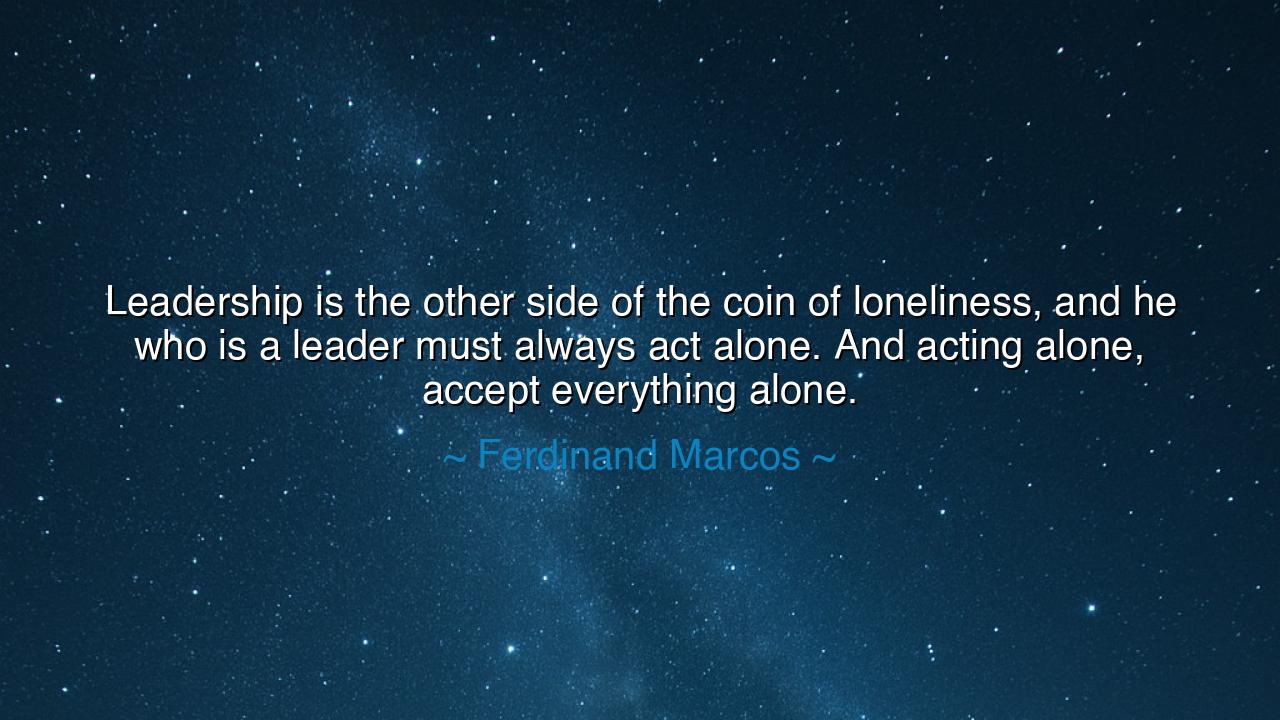
Leadership is the other side of the coin of loneliness, and he
Leadership is the other side of the coin of loneliness, and he who is a leader must always act alone. And acting alone, accept everything alone.






"Leadership is the other side of the coin of loneliness, and he who is a leader must always act alone. And acting alone, accept everything alone." These words by Ferdinand Marcos, former president of the Philippines, offer a deep reflection on the nature of leadership and the solitude that often accompanies it. To lead is to carry a burden that others may never fully understand, and to accept the weight of that responsibility often means facing it alone. The leader, as Marcos suggests, stands at the crossroads of decision and consequence, knowing that his actions not only define his own path but also shape the destinies of others. In this context, loneliness becomes not a weakness, but a necessary companion to those who rise to lead. To lead is to walk a solitary road, where decisions and sacrifices are made with little comfort, but with the certainty that the course must be set alone.
In the ancient world, the concept of leadership was intertwined with sacrifice and loneliness. Alexander the Great, for example, is remembered not just for his military genius but for the deep solitude that came with the weight of ruling an empire that stretched across the known world. Though surrounded by loyal soldiers and advisors, Alexander often made critical decisions alone, understanding that the fate of his empire lay on his shoulders. His decisions were not made in consultation with others but through his own conviction and vision. Socrates too, in his role as a moral and intellectual leader, faced loneliness as he chose to walk a path of individual truth, even when it led to his death. His leadership was not the leadership of a king or general, but of a thinker willing to stand alone in the pursuit of knowledge and justice. For these figures, leadership was synonymous with personal sacrifice—a solitary journey that often left them isolated in their beliefs and actions.
Cicero, the Roman statesman and philosopher, echoed a similar sentiment in his writings, where he spoke of the responsibility of leadership not as a gift, but as a burden that demanded self-reliance and inner strength. He understood that the leader’s journey was often one marked by loneliness, as the leader must rise above the passions and biases of the people to make decisions that serve the greater good. To act alone, without the comfort of mass approval, requires the courage to stand firm in the face of opposition, knowing that true leadership demands resolve and the acceptance of criticism from those who follow. Marcos' words, though they come from a more modern context, reflect this ancient understanding that greatness in leadership comes with the burden of loneliness and the weight of decisions made in isolation.
The story of Winston Churchill during World War II is another striking example of the solitude that comes with leadership. As Prime Minister of the United Kingdom during one of history’s darkest hours, Churchill often had to make decisions that were not only difficult but unpopular. He stood alone in his determination to resist Nazi Germany, even when the path ahead seemed uncertain and the country was divided in its support. Churchill’s leadership was marked by moments of profound loneliness—he was often isolated in his vision, yet he accepted the weight of his responsibility and made choices that shaped the future of the world. Churchill’s leadership was not about popularity, but about making decisions that were right, regardless of the personal cost or the loneliness that came with them.
In modern times, we see a similar dynamic in the life of Nelson Mandela. His leadership in the fight against apartheid in South Africa was marked by solitude—particularly during the 27 years he spent in prison. Despite the physical separation from the world, Mandela’s resolve remained unbroken. His ability to lead the nation toward reconciliation and unity came from his deep understanding that leadership is often a lonely endeavor, requiring sacrifice and the courage to face adversity head-on. Mandela, like the leaders of the past, knew that his legacy would be defined not by the comfort of being surrounded by allies, but by his willingness to stand alone in his commitment to justice and freedom.
The lesson in Marcos’ words is one of courage, resolve, and the acceptance of solitude as an inevitable part of true leadership. To lead is not to follow the easy path of consensus or popularity but to make decisions based on what is right, even if that means standing alone. The leader must understand that every action, every decision, carries a weight that others may not fully understand, and it is this solitude that defines the leader’s true character. Leadership requires a strength that is not dependent on the approval of others, but on the conviction to make decisions that may not be popular, but are necessary for the greater good.
In our own lives, we must learn from Marcos, Churchill, and Mandela the value of self-reliance in the face of adversity. We must accept that the path of leadership, whether in our families, careers, or communities, may often lead us into places of solitude, where the opinions of others are distant and where we must rely on our own sense of what is right. Let us stand firm in our convictions, knowing that the burden of leadership is not to be feared, but embraced. By doing so, we can rise to the challenges before us with courage, knowing that in moments of loneliness, we find the strength to lead with honor, integrity, and purpose.






AAdministratorAdministrator
Welcome, honored guests. Please leave a comment, we will respond soon